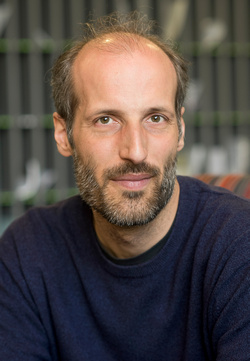Martin Hairer


Professor Martin Hairer
Degree of Doctor of Science, honoris causa (2016)
Born in Switzerland to Austrian parents where his father was a mathematician, the young Martin Hairer was intrigued by scientific technologies and mathematics from a young age. In fact, his first scientific explorations involved creating computer software. While still in high school he attempted to produce computer software that could “read” musical sounds and produce a music score mirroring those sounds, though he admitted later that such endeavour was actually beyond his abilities at that time.
The young Hairer started studying both mathematics and physics at the undergraduate level, and shifted to theoretical physics at the graduate level, at the University of Geneva.
After graduating from Geneva with a PhD, Dr. Hairer went to the University of Warwick in 2001 under a postdoctoral fellowship and later an advanced fellowship from the Swiss National Science Foundation. Besides doing research at Warwick, he started picking up again his high school dream, pursuing concurrently the professional field of software development, which resulted in the setting up of his own software company, HairerSoft. The company later turned out two software packages that are named after a famous Austrian musician, Amadeus Lite and Amadeus Pro. These software programmes, very powerful audio editor and supporting a variety of sound formats, are used widely by music professionals and also listed among the Mac software products.
In 2004, Dr. Hairer accepted a faculty position at the Mathematics Department of Warwick. By then, he appeared to have returned to “pure maths”. Before he turned thirty, his work on the heady sphere of stochastic partial differential equations had already catapulted him into international recognition.
Stochastic analysis is a form of mathematical modeling that seeks to use differential equations to characterise random movements of various kinds of known phenomena. Among the examples Professor Hairer has given to explain this realm of study to popular audiences is to indicate the complexities involved when a sheet of paper burns, and yet burns unevenly, even causing the sheet to tremble in the process of its being consumed by the flames; another is to describe how the magnetic field that emanates normally by a magnet in a recognisable pattern is transformed dramatically into random outflows as the magnet is heated up to levels that actually come close to destroying the magnetised material that constitutes the magnet under less abnormal conditions. Stochastic partial differential equations provide a mathematical method that describes these immensely fluctuating scenarios in ways that bring precision and insight into those phenomena, where previous forms of mathematical modeling were unable to do so.
In 2012, twelve Regius Professorships were set up in the United Kingdom in celebration of the Diamond Jubilee of the reign of Queen Elizabeth II, and Warwick obtained the right to nominate a “Regius Professor in Mathematics” in 2013. A year later, Professor Hairer was presented the “Regius Professor of Mathematics” at Warwick in recognition of his distinguished contributions to teaching and research. The same year, Professor Hairer was elected Fellow of The Royal Society, United Kingdom; and the International Mathematical Union presented him the Fields Medal, the highest honour a mathematician can achieve and an award considered the Nobel Prize equivalent.
A competent communicator in English, French and German, Professor Hairer has become an international ambassador in contemporary mathematical research by communicating complexities of his own mathematical research at levels that can be understood with appreciation by laymen. He continues to work on his software products as creator, entrepreneur, and customer advisor, and so has sustained an interest in this realm of technological innovation that earns him public acclaim.
Though still a relatively young professor, Professor Hairer has excelled in mathematical research, teaching and writing, and has been recognised internationally as a remarkable scientist and cultural ambassador. In addition, he has manifested entrepreneurial skills in software creation and business acumen that warrant our sincere admiration. For all his achievements and contributions, Professor Martin Hairer is nominated for the award of the degree of Doctor of Science, honoris causa.